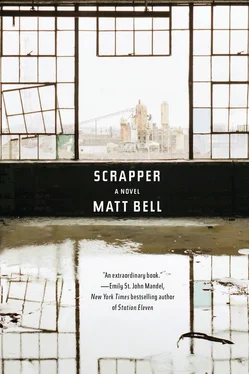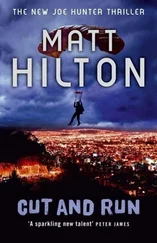The more you watched the more visible you became. Every hour spent walking behind the child was another chance someone might notice. A police officer, a neighbor. A passerby, a bystander. But the child himself would be the first to see you for who you were, although you didn’t imagine this possibility at first. This was another thing you learned only in the low rooms, each a new space carefully chosen, prepared, soundproofed, and locked, one room for one boy. On the surface, each face required you to separate one expression from another, from the endless variety of human emotion, but faces were different in private than in public. Faces were different in the dark.
You left clumsiness behind in the first few takings. There was a lesson in the early mistakes, prompting the cultivation of a care you had never before exhibited. You hid the taking from yourself but you couldn’t hide the preparation. The soundproofing and sequester. You liked the houses with names on them the best: names beside doorways, on mailboxes, anywhere. Scrawled into the back of closets.
You became more complex with every taking. In the past you had acted without premeditation but now all your life was premeditated. The difference between the now thought and the then thought: you hadn’t known the monochrome of your movements until the first watching busted the seams of the world, filling it with color, movement, a low hum becoming a buzz between the ears. This ringing was what it meant to be a person. You hadn’t known, hadn’t ever imagined, the dim world could be made so loudly beautiful merely by having someone to watch, to make watch you back.
HE HADN’T HIT THE HEAVY bag in ten years but after the fight in the parking lot he went looking for a gym, somewhere to train. The morning after his first workout he woke up unable to straighten his arms but before work he went back for more, tried to put the same soreness in his legs. It took a long time to lodge the feeling where he wanted it, so close to the bones. His body was strong from work but he wanted it to be stronger. He winced around the apartment, made breakfast hunched over with his arms curled up near his chest. He contorted his body in the shower, found an angle to brush his teeth where the burning in his biceps went away. Dressing became a supreme act of will. He’d done too much but he wanted to do more. The bench press, the lat pulldown, the curls and tricep extensions, these were the beginning, what he remembered without effort, what he could do alone without needing to ask for a spot.
He was the strongest he’d ever been but he wanted to find his limits. He lifted in the mornings and after he lifted he worked, swung the sledge and worked the shovel, drove busted drywall downstairs in wheelbarrows. When he went to bed he suffered through the angry stress of repetition, the lactic stretch of a body growing out of strained muscles, and after the first week he switched gyms, found somewhere cheaper, deeper in the zone, where he wasn’t wanted. The manager said he was welcome to try but he wouldn’t last. He referred Kelly back to the gym he had left but Kelly shook his head. He wanted to be held apart. He told himself the will to fight wasn’t about the color of a man but the otherness and he didn’t know how this was different, only that to him it was. He wouldn’t have said these things aloud, would have denied them if accused. The case notes had started calling for a man like the mugger and this place allowed him to fight such men. To align his aggression with the image in his mind.
The other boxers’ tattoos were different than the tattoos he’d known. He didn’t know the subtleties of their speech, the nuanced syntax of their slang. He couldn’t always beat the other men — in the beginning, he never could — but he could fight against their difference, could throw himself against what he told himself he was not. In the past, sparring had focused his instincts, forced him to act differently than in bar parking lots. Beyond the greater strength and training of his opponents he was also at a forgotten disadvantage, deprived of many of his oldest tactics, the wrestler’s grips and tricks he could use in the gravel and the dirt but not here, between the yellow lights and the cracking mats covering the floor. Out in the world he had counted on the other person having more to lose than he did or at least believe he did. In the ring there were safeguards in the way of total loss and so his pretense of fearlessness had less strength.
These men stood naked to the waist in their padded helmets and padded gloves and they put those gloves together and they spoke their prayers aloud, gave the familiar words new inflections. He’d grown up among people who mumbled their professions of faith, who sang hymns as if a monotone made the sweetest music. These men craved bravery and victory, forgiveness and salvation. They said that to perfect what you were given was to become mighty in your gift. They said a great fighter was a man who loved the body God had made, who loved it with bench presses and curls and squat thrusts and leg presses and the impact of fist on flesh.
The men at the gym had their methods but in the zone he had built his body in another way. It was not a temple. Or if it was then it was one more beautiful for being ruined. His uneven heart, an ulcerous stomach. Manual labor had set predictable pops and creaks into his joints, the telling music of early onset arthritis. He had forgotten the origins of most of his scars but he knew they spoke to other men, suggested a certain hardness. Or else bad luck, some idiocy in the way of his quitting.
Trainers arranged bouts by weight class but after the soreness receded Kelly signed up to spar with whoever would agree. He didn’t have the right shoes but you could buy shoes. He wrapped his hands and put in a mouthguard. He’d had to buy equipment but he had the reward money, the promise of more paychecks. He didn’t want all this protection but this was the price of arranged fighting.
He put his hands on men his own size but he preferred heavier fighters, the density of their bodies bowing below his blows, each jab like punching a statue made of meat. When their fists connected with his skull he heard memories realigning into new spaces. The shattering of old logic, his heartbeat rising as the speed of thought slowed, consciousness fading not in a subtle turndown but in a series of pulses, a drop in ability ten or twenty or thirty percent at a time.
They weren’t supposed to go this far but their honor system said it was up to him to stop the sparring, to wave off the bigger and stronger man. He never gave up, never gave in. There could be blood in his eyes or in his mouth and then he believed he heard it sloshing between his ringing ears, in the low cavities of the body. When he couldn’t breathe he spit out his mouthguard to clear his airway, gestured with his gloves that he was coming back for more.
In the case notes the story got more determined as time passed but maybe it remained a fiction. His own past often faded and cracked open, let in white space between fragments of sensible time. If he found he knew too much he stopped trusting what he thought he knew. Some of the pages of the notebook contained drawings, smeared sketches. Some drawings were of the house where he’d found the boy, its doorways and staircases, its blue siding and peaked roof. When Kelly next returned to the notebook he found several sketches of a suspect. He didn’t know what the kidnapper looked like and the boy remembered only the mask watching, the rough handling of gloved hands, the red rain slicker — Kelly didn’t necessarily remember drawing the sketches but there they were, rendered with his amateurish pen. The faces in the sketches wouldn’t have moved anyone else but they moved him: the sketches were of the mugger or else, sometimes, the brother, who Kelly had not met, who the boy would no longer speak of, who he would no longer blame for the bruises Kelly spotted pressed into his upper arms.
Читать дальше












